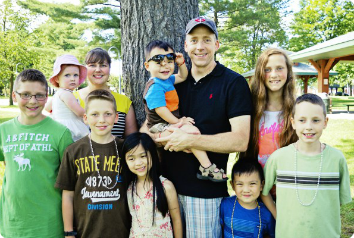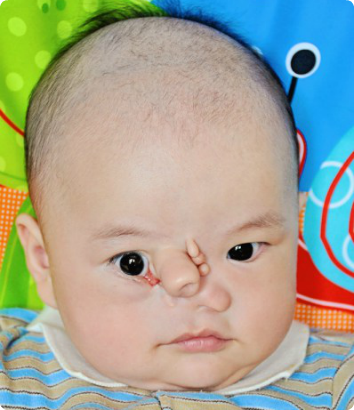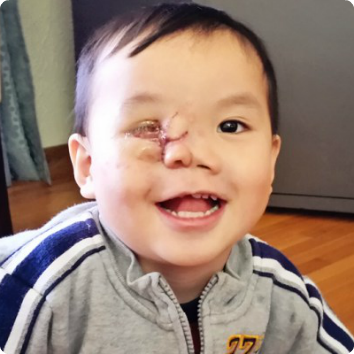 There is an art to a successful adoption announcement when you are adopting a child with a visible difference. You learn to manage the situation, to set up the encounter in ways that you would never think about when you adopt a child who looks more typical.
There is an art to a successful adoption announcement when you are adopting a child with a visible difference. You learn to manage the situation, to set up the encounter in ways that you would never think about when you adopt a child who looks more typical.
You mention your referral.
Your friend expresses excitement and asks to see a picture.
You stall and pretend to search through your purse looking for the photo or swipe pointlessly through your phone pictures, keeping up a steady, but peppy dialog.
You talk about your excitement and then mention, in your rehearsed, faux off-handed way that your child has xyz medical condition.
You give a minute-long medical summary to allow your friend to moderate her response to the picture.
You suddenly “find” the picture you were searching for.
Just before handing over the photo, you mention – yes, you always mention – “We are so excited! We think he is adorable and perfect for our family.”
Be sure to add that so your friend knows how she is expected to respond. She will appreciate this.
Then hand over the picture. Brace yourself and wait for the brief confusion to clear from your friend’s face as she deciphers the picture.
Hold your breath.
Wait for it.
Wait for it.
“The doctors can fix that, right?”
You see, I know what you see when you see my son, my beautiful, charming, easy going son. My brilliant son—although I may be slightly biased. You can’t at first see him for his innate amazingness. You initially see something wrong that needs to be fixed. I don’t judge you for it. I had the same initial thought.
Something is wrong. It needs to be fixed.
What I have come to realize is the “fixing” part isn’t the hard part of adopting a child with a visible facial difference.
The truly difficult part is saying goodbye to the sweet differences you adore.
The challenge is not falling in love with the face God has given him, it is trusting that you will fall in love with his new face.
My husband and I had planned on adopting again, but not for a couple of years. God had other plans.
I had seen our son being advocated for extensively. But there were so many reasons I thought he couldn’t be our son including the fact that he would be a virtual twin to our youngest child who was facing medical complications of her own (they are 2 ½ months apart in age).
We hadn’t saved up enough money to fully fund another adoption.
He was with an agency other than the one we had loved for our prior adoptions.
We were just starting to catch our breath after adding three children to our family in three years.
Did I mention that we already had seven children age 13 and under?
Seriously, who does that?
And then there was his medical need. It was just so different.

The referral photo that Kristin fell in love with.
Davis was born with a Lateral Proboscis. That is a fancy way of saying he has a facial cleft affecting his eye and nose. One of his nostrils did not form typically; instead of a right nostril, a nasal tube protruded from the inside corner of his eye. He had an incompletely formed upper and lower eyelid which prevented him from being able to close his eye completely.
That was what was known.
His file also indicated an unspecified heart condition as well as a presumed mix up with another child’s file that would have involved another serious, lifelong medical need.
But God led me to that sweet face.
And once I fell in love with that picture, I was sure everyone else would, too. I monitored the advocacy page multiple times a day, certain that someone would see how perfect this boy was, and I prayed for his family to find him. Yet he hadn’t been matched and his file disappeared from the agency’s advocacy page.
A few days later, I found that his file had been transferred to the agency we had used in our prior adoptions, Children’s Home Society of Minnesota. I started to feel giddy about his file transfer. Not for myself, of course, because it wouldn’t make sense for us to pursue the adoption for all the reasons stated previously. At least that is what I told myself as my heart fell in love with this boy.
One day when I was slightly obsessively checking his status, my heart pounded and my hands shook. Davis had a child-specific grant assigned to him which would cover the cost of his adoption study.
God opened the door. We just had to step through it in faith.
I tried to research his condition, but there are only a handful of people in the world born with this need as it presents in Davis. I found only two case studies online discussing the treatment of this need. We read about possible neurological components and additional medical needs that could coincide with a Lateral Proboscis. I contacted every craniofacial support group I could find online asking if they knew of anyone in their organization who has experienced this specific diagnosis, but they all regretfully replied that they didn’t know anyone I could talk to about this need.
Finally, I contacted numerous hospitals and highly rated craniofacial teams across the country. While everyone was very eager to take Davis as a patient, only one had ever performed this surgery.
One.
Fortunately for us, we had some experience with craniofacial needs. Both of our children from previous adoptions had cleft lip and palate, with our daughter having had no corrective surgeries prior to coming home. We knew the medical resources available for Davis’s special need and felt as comfortable as we could that we could provide for his care. The surgeons we selected were experienced and eager to work their medical miracles on him.
When Davis finally arrived, he was sweet, inquisitive, and hungry. Within hours, our toddler was repeating words we said. Within days, he could name all his siblings in the photo book we sent him. He gave hugs and was eager to help.
I wanted to show him off to the world.
But public spaces in China are not always easy to navigate when you have a visible difference. I had expected long looks, and even whispering among the people we encountered because that had been our experience with our daughter when she had an unrepaired cleft lip. I had not been prepared for what we actually experienced.
There were stares, comments, and many, many furtive pictures taken of my boy. People followed us for blocks, pointing at my child.
We attempted to respond in kindness, smiling at those who looked, but sheltering our son as best we could from any noticed hostility. Nothing brings out the bonding of a mother to her new child more than the child’s need to be protected.
Not everyone responded in such a way to our son, though. He was clearly beloved at the orphanage in which he lived. Nannies reached out to hug him, hold him. They offered him treats and sang him songs. They doted on him in a way that made my heart swell with joy.
We noticed and truly appreciated the people who responded to him with tenderness when we were out and about, like the elderly woman in the Visa office who moved her package off the gray seat beside her so we could sit with Davis. She rubbed his arm and smiled at him. I don’t know the words she was saying, but they were clearly heartfelt and were exactly what I needed to hear at that moment.
Adoption is such vulnerable time for a parent’s heart.
I wanted everyone to fawn over my child and gush lovely things like any parent of a new child would.
After a year of longing for my son, I wanted everyone to share my joy.
Upon returning home our days consisted of an insane number of medical appointments – primary care physician, cardiologist, eye surgeon, ophthalmologist, audiologist, craniofacial surgeon, CT scan, etc.
We discovered that for every medical unknown we had worried over, he had the best case scenario. When he was home about six months, he began a series of surgeries which had the ultimate goal of protecting his affected eye and vision.
While I had confidence in the many surgeons’ abilities to successfully treat my child, the biggest heartache I faced was knowing that the surgeons were, in fact, going to be successful. I knew they would change my child’s face into a more typical, more socially acceptable face. How could I explain to anyone who hasn’t undergone something similar that the more ordinary looking face that everyone was striving for was a necessary, but unwanted side effect from surgery that was medically necessary to improve and preserve my child’s vision?
My heart was broken that his perfect little face was going to irrevocably change.
In the lead up to surgery, multiple medical professionals flood the tiny pre-surgery room, bringing toys, checking vital signs, confirming the body part to be operated upon.
The anesthesiologist arrives, starting in with questions about family history. We have no answers. “We might have to modify the intake of anesthesia because we are not sure how well the mask will fit him. Without a sinus cavity, it may affect how he responds.” I nod and smile because that seems like the only acceptable response to hearing that your child poses unique challenges for the anesthesiologist.
The surgeon arrives wearing Star Wars themed shoes. “I’ve been excited about this surgery for weeks.” This surgeon has operated on some of my other children and his eagerness is oddly reassuring.
Another surgeon says, “Our goal is to get the eyelid to be able to close, but until we really get in there and see the structure, we won’t be sure of the best method.”
She reviews Plan A with us. “If that doesn’t work, we have Plan B, Plan C, and Plan D.”
One of the plans involves taking a layer of skin from the inside of his eyelid for a skin graft. I feel like this possibility should have been brought up more than an hour before surgery, but I realize prior knowledge wouldn’t have changed anything. With no established techniques for this type of operation, I know there will be a lot of improvising during surgery. I smile, nod, and sign the consent form that gives permission to repair his eye “by any means necessary” – one of the more frighteningly open-ended documents I have ever signed.
Because the anesthesiologist knows we have been through multiple surgeries with our children, he allows both my husband and me to go into the operating room while Davis is put under, instead of following the usual one-parent-only protocol. Davis lies on the bed in his purple hospital pajamas, clutching a photograph of the hospital’s comfort dog he had met an hour earlier.
I lean over him, holding his hands on his chest as he breathes in the bubble gum scented air. Then I smell the acrid “sleepy air” when the laughing gas is switched over to the anesthesia. While Davis’s body starts to jerk and his breath becomes erratic from the anesthesia, I continue to sing You are my Sunshine through my surgical mask. The nurse holding the mask over Davis’s mouth sings along softly. When Davis’s eyes stop rolling, I know he is under. I lower my mask and kiss his unaltered face for the last time.
Walking out of the operating room is an act of willpower.
 Davis ended up having four surgeries in the course of a month, with his most recent taking place last week. We know there are several more surgeries in his future, but for now we are settling back into a semblance of normalcy without round the clock narcotics or arm restraints protecting him from accidentally tearing stitches or bandages off his face.
Davis ended up having four surgeries in the course of a month, with his most recent taking place last week. We know there are several more surgeries in his future, but for now we are settling back into a semblance of normalcy without round the clock narcotics or arm restraints protecting him from accidentally tearing stitches or bandages off his face.
We have felt God’s hand throughout the process to adopt Davis and in the months following when we became a family. We are so grateful to have followed where God led and feel incredibly blessed to get to love this sweet boy forever.
And as for falling in love with his new face?
I am already there.
About the Author: Kristin blogs about motherhood, parenting and adoption on her blog “Trying to Control the Chaos.” She also blogs for No Hands But Ours, where this was originally published. She has also graciously allowed us to republish her blogs about her daughter’s cleft lip & palate surgery as well as her son’s cleft palate surgery.


